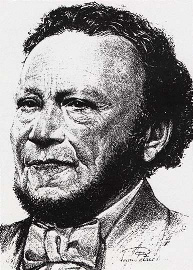Surely one of the more fascinating and unjustly overlooked characters in the Northwest’s pioneer history is George Washington Bush. He was, by some accounts, the first American to establish a permanent settlement in what is now Washington. He was, in a literal sense, a trail-blazer, a home-steader, and farmer. He was also black, and so became a pioneer against racial discrimination on the frontier.
Rather than submit to racially discriminatory laws passed in Missouri, he sold his farm there and headed west in 1844 in search of a freer country in Oregon, aiming to settle in the Rogue River Valley. A veteran of the War of 1812, Bush had actually already been to Oregon, having lived there as a mountain-man and traveling to the Pacific with a fur company some twenty years earlier. As a consequence of his considerable experience, he was asked to co-lead a party of five families, together with Michael T. Simmons.
When the Bush-Simmons party reached the Columbia River, however, they discovered that the Oregon Provisional Government had recently enacted a Black Exclusion Law. Faced with continued mistreatment as a second class citizen—including legally-sanctioned flogging if he settled in Oregon—Bush took his family north. The rest of the party, all of whom were apparently white, abandoned their plans in order to join Bush in forging a path to a site near present-day Tumwater, now known as Bush Prairie.
In the burgeoning south Puget Sound region, Bush became well regarded for his skill as a farmer, as well as his remarkably open-handed generosity. He was also known for his unusual comity with his Indian neighbors, providing medical treatment when epidemics occurred and teaching his family to speak the Nisqually language.
Yet the racial exclusion laws that had dogged him from Missouri to Oregon continued to plague him.
An 1846 treaty fixed the British-US border on the 49th parallel, which brought Bush’s farm, along with the rest of present-day Washington, under discriminatory US laws that has previously not applied north of the Columbia. (South of the Columbia, Oregon had been governed by a Joint Occupation agreement between Britain and the US until it became a US territory; it first enacted racial exclusion laws during the Joint Occupation period.) As a consequence, Bush did not have clear legal title to his land until after the Washington Territory was created in 1853.
Bush was sufficiently well-established and well-connected that the first territorial legislature unanimously passed a special resolution urging Congress to confirm the Bush family’s disputed title to their land, in spite of a federal law that prohibited it. (Technically, the Donation Land Claim Act of 1850 did allow racially mixed men to own land, and since Bush was half-white he should have been eligible under the law. But his skin was apparently dark enough that the US Census classified him as a negro and therefore ineligible.) It is a measure of that era’s engrained prejudice that the legislature did not object to the discriminatory laws themselves, but rather asked for—and got, in 1855—a special loophole for Bush.
Bush operated one of the most successful and modern farms in the Puget Sound region until his death in 1863. His son, Owen Bush, became an influential member of the first Washington State legislature in 1889-90. Yet despite his extraordinary contributions to the Northwest’s settlement, George Washington Bush was never granted full citizenship and was never allowed to vote.
Notes: In writing this post, I relied heavily on several sources, including an excellent description by the US National Park Service; a pair of 2001 biographical pieces by Kit Oldman at Historylink.org, here and here; and a tribute by the Discovery Institute’s Bruce Chapman. (I actually helped research Chapman’s piece when I was an intern at Discovery while in college.) I also consulted this Wikipedia article, and Cecelia Goodnow’s 2002 account.
As happens so often with historical research, this exploration revealed dozens more tantalizing paths to explore. I’ll mention just two now: Bush’s father, Matthew Bush, and Michael Simmons. Here’s how the NPS article describes Matthew Bush:
Matthew Bush, had been an African American born in India, the life-long servant of an English merchant named Stevenson. Stevenson later settled in Philadelphia, where he owned several ships. Matthew Bush married an Irish maid of Stevenson’s, and together they cared for Stevenson in his declining years. Since Stevenson had no children, he left a substantial fortune to Matthew Bush.
Fascinating. It’s worth noting, by the way, that George Washington Bush was Matthew Bush’s only child, and he inherited enough from his father’s estate to be financially independent.
I’m also fascinated by Michael T. Simmons, to whom much credit is due. Variously described as an Irish immigrant or a white Kentuckian, it was apparently his initiative to share leadership with Bush on the trip west. When confronted with the discriminatory laws in Oregon, he set off into unsettled country with his friend, presumably at some risk to his family. Yet the two men apparently benefited one another a great deal. Bush, who was wealthier, later provided financing for Simmons’s sawmill operation in the Tumwater area. Despite being illiterate or semi-literate, Simmons became an important player in early Washington. He was Olympia’s postmaster, a justice of the peace, and was well-connected to Washington’s political establishment, including the state’s first governor, Isaac Stevens. He used his influence to forestall the loss of Bush’s land until Congress passed an exemption. He is also credited with breaking with the governor to oppose bans on nonwhite land ownership in Washington; due in large measure to Simmons’ efforts, Washington did not adopt racial exclusionary laws.


Comments are closed.